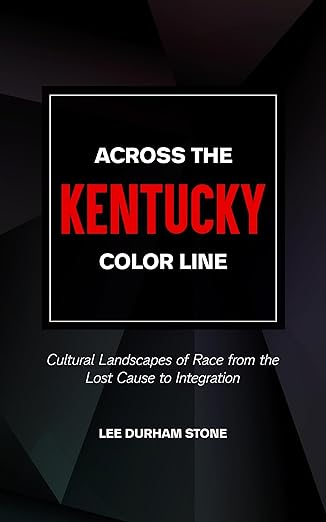ACROSS THE KENTUCKY COLOR LINE by Lee Durham Stone (Jamaica)
Across the Kentucky Color Line:
Cultural Landscapes of Race from The Lost Cause to Integration
by Lee Durham Stone (Jamaica (1979-82)
Self Published
December 2023
300 pages
$7.99 (Kindle); $27.00 (Hardback)
In Beloved, novelist Toni Morrison has her protagonist Sethe say that she thought she was “gonna die in wild onions on the bloody side of the Ohio River.” That violent side of the river was Kentucky, the subject of Across the Kentucky Color Line. This study examines Kentucky’s violent history of racial relations from 1865 to 1970, focusing on Muhlenberg County, its seven contiguous neighbors, and others in the Bluegrass State. The author prefaces the book with his experience of a segregated school trip to see “The Ten Commandments” in 1957.
About Lee Durham Stone

Lee Durham Stone (Jamaica 1979-82)
Lee Durham Stone was born in the Bluegrass State (Lebanon); grew up in Central City, Muhlenberg County, as a printer’s devil in his father and uncle’s newspaper (the Central City Times-Argus); graduated from the University of Kentucky (1970); and inspected strip mines for the Department of Natural Resources in eastern Kentucky (Hazard Area Office).
From Appalachia, he served three-and-a-half years as a Peace Corps Volunteer in Jamaica (1979-1982).
After Peace Corps, Stone taught World and A.P. Human Geography for 23 years in Mississippi and Kentucky. Recently, he completed an M.A. in American History in the Gilder Lehrman Institute’s graduate program at Gettysburg College (2023). He now lives in Franklin, Kentucky.
The genesis of this book began when Stone moved back to Kentucky in 2012 and after finishing a Ph.D. the following year. Dr. Stone started reading the Commonwealth’s history and wondered about subjects he discovered were underexamined, especially the Black experience in his home area. Thus, he began to research and write a history manuscript in earnest.
The author had few preconceived notions of this past, primarily because he knew little of it. Sometimes, it helps to begin as a novice. Nonetheless, one must determinedly start the process of researching and writing to be able to do the learning. They work interactively. As a postmodernist historian advises: “[N]o historians can possibly know what they believe to be the nature of the past until they start to history it.” Alun Munslow uses “history” and “historying” as action verbs to highlight the authorial act of narrative creation. In other words, and as much as we might resist the notion, the historian-as-author creates, albeit using verifiable facts as raw material, one version of “the past.” This “past” is always discovered.
Stone separated his decade-long discovery into two books, of which this is the first. The second will be about enslavery and the Civil War.
What inspires you to write?
I am inspired to write for the same reason I became an educator: Since childhood, I have had a profound thirst for knowledge of how the world works. Reading, researching, and then producing a narrative deepens the knowledge and makes it conscious and digested.
What authors do you read when you aren’t writing?
Top historians and social scientists.
Tell us about your writing process.
My writing of nonfiction is rather desultory, although I begin with a vague plan. Afterward, as I read a rather large amount (usually by using book indexes), I am always aware of how I might use passages, quotes, concepts, and ideas that I gleaned from my reading. Then, I plop them into the document I am working on. This may be too random for much efficiency, but this is my method.
What advice would you give other writers?
Collect books so they are nearby. This way, you simply go to your bookshelves and again scour the contents.
How did you decide how to publish your books?
I worked with an academic publisher for six years, but eventually, our cooperation fell apart. So, after ten years, I decided to self-publish.
What do you think about the future of book publishing?
Every genre is massively crowded. So, it is a tough endeavor. However, people will keep buying books.
What genres do you write?: American history, Southern history, Kentucky history, enslavery, the Civil War, Reconstruction, African American history
What formats are your books in?
Both eBook and Print

No comments yet.
Add your comment